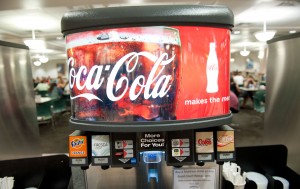In a recent demonstration on campus, students handed out soda in an effort to raise awareness of a petition to request caffeine on campus. Police informed the students that without proper authorization, they were not allowed to hold the event on campus. The students complied and moved to a site off of BYU property.
Lt. Lemmon of the University Police commented on the situation, stating that the reason police responded to the situation was students were promoting products on campus.
“We did not view it as a protest,” Lemmon said. “In order to promote or sell any product, you need approval from the dean of student life. I don’t know if (the drinks) were caffeinated or not. That was not the issue.”
The issue was students had not gone through the proper channels to hold an event on campus.
One option for students wanting to voice their concerns is to meet with a representative of the Student Advisory Council, a subsidiary of the BYUSA. According to Christina Westover, the vice president of SAC, the council consists of 40 students who meet with administrators one or two times a week.
“The council acts as a bridge between students and the administration,” Westover said.

“It is very important to us that students know they have a connection to administration,” Klemme said.
Klemme also briefly discussed the caffeine issue from the council’s viewpoint. The goal of the council is to raise awareness of an issue with the administration and that awareness has been achieved through other means.
“What I can say is that people who are aware of the issue are working on the issue,” Klemme said.
At the beginning of the semester, a student representative proposed looking into the caffeine issue as a research project and brought it up to the administration. When the event on campus occurred, the representative backed away from the issue.
“He (the representative) didn’t want to be associated with that type of approach,” Klemme said.
Overall, Klemme said the incident was not the best approach to the situation.
“The approach taken by students in general could have been carried out a little more eloquently,” Klemme said. “There were a lot of things that were red flags, and it wasn’t just the caffeine issue.”
Klemme stressed the importance for students to use their resources on campus.
“Our message is that it is always best to work with the administration,” Klemme said.




